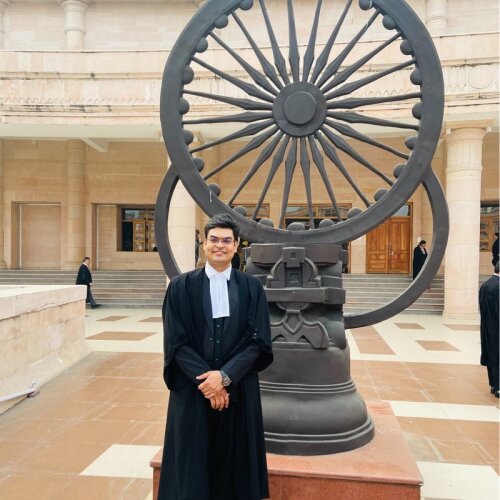Best Hiring & Firing Lawyers in Lucknow
Share your needs with us, get contacted by law firms.
Free. Takes 2 min.
List of the best lawyers in Lucknow, India
About Hiring & Firing Law in Lucknow, India
Hiring & Firing law in Lucknow, India encompasses the legal regulations and procedures related to the employment relationship. It covers the recruitment, selection, and termination of employees in both public and private sectors. These laws aim to ensure fair treatment, protect the rights of both employers and employees, and establish a just and harmonious work environment.
Why You May Need a Lawyer
There are various situations where seeking legal advice from a lawyer specializing in Hiring & Firing can be crucial. Some common scenarios where you may need a lawyer include:
- If you are an employer facing a wrongful termination lawsuit.
- If you believe your rights as an employee have been violated during the hiring or firing process.
- If you are considering terminating an employee and want to ensure compliance with relevant laws to avoid legal repercussions.
- If you need assistance in drafting clear and legally sound employment contracts, policies, or termination letters.
- If you are an employee and suspect discrimination, harassment, or a breach of contract in relation to your termination or hiring process.
Local Laws Overview
In Lucknow, India, several key aspects of local laws are particularly relevant to Hiring & Firing, including:
- Indian Contract Act: This law governs the formation and enforcement of contracts, which are crucial in employment relationships.
- Industrial Disputes Act: This act provides a legal framework for the resolution of disputes between employers and employees, including termination-related conflicts.
- Equal Remuneration Act: This legislation ensures equal pay for equal work, regardless of gender, in the workplace.
- Employees' Provident Fund and Miscellaneous Provisions Act: This act establishes provisions for the social security of employees, such as the provident fund scheme.
- Labour Laws: Lucknow adheres to a range of labor laws, including the Payment of Wages Act, Factories Act, and Shops and Establishments Act, aimed at safeguarding workers' rights and setting standards for employment practices.
Frequently Asked Questions
Q: What constitutes wrongful termination in Lucknow, India?
A: Wrongful termination refers to the unlawful dismissal of an employee. It may include termination based on discrimination, retaliation for whistleblowing, violation of employment contract terms, or termination without due process. Consulting a lawyer can help determine if your termination is wrongful.
Q: Can an employer terminate an employee without any reason?
A: Yes, under Indian law, employers generally have the right to terminate an employee without providing a reason, as long as it is not discriminatory or in violation of the employment contract and statutory provisions. However, certain categories of employees, such as those protected by labor laws, may have additional safeguards against arbitrary termination.
Q: What steps should be followed for a lawful termination?
A: To ensure a lawful termination, it is advisable to follow these steps:
- Review the employment contract.
- Provide written notice of the termination, as specified in the contract or labor laws.
- Conduct termination meetings, clearly communicating the reasons.
- Comply with any notice periods or severance pay obligations.
- Maintain documentation related to the termination.
Q: How long does it usually take to resolve an employment dispute in Lucknow?
A: The duration of resolving an employment dispute can vary widely depending on the complexity of the case, the court's workload, and other factors. It may take several months or even years to reach a resolution. It is advisable to consult with a lawyer who can provide a better estimate based on the specifics of your case.
Q: Are there any protections against workplace discrimination in Lucknow?
A: Yes, workplace discrimination is prohibited under various laws in Lucknow, including the Constitution of India, the Indian Contract Act, and the Equal Remuneration Act. These laws safeguard individuals from discrimination based on factors such as gender, religion, caste, disability, or sexual orientation.
Additional Resources
If you are in need of legal advice or further information on Hiring & Firing law in Lucknow, the following resources can be helpful:
- Lucknow District Court website
- Labour Commissioner Office in Lucknow
- National Commission for Women
- Municipal Corporation of Lucknow - Labour Department
Next Steps
If you require legal assistance in Hiring & Firing matters in Lucknow, India, follow these steps:
- Gather all relevant documents and information regarding your case.
- Research and identify reputable lawyers or law firms specializing in employment law.
- Schedule a consultation with a potential lawyer to discuss your case.
- During the consultation, inquire about their experience, fees, and strategy for handling your specific requirements.
- Select a lawyer whom you feel comfortable with and who exhibits expertise in Hiring & Firing law.
- Formally engage the chosen lawyer by signing a legal services agreement.
- Work closely with your lawyer, providing all necessary information and cooperating throughout the legal process.
- Follow their guidance and pursue legal action or resolution as advised.
Lawzana helps you find the best lawyers and law firms in Lucknow through a curated and pre-screened list of qualified legal professionals. Our platform offers rankings and detailed profiles of attorneys and law firms, allowing you to compare based on practice areas, including Hiring & Firing, experience, and client feedback.
Each profile includes a description of the firm's areas of practice, client reviews, team members and partners, year of establishment, spoken languages, office locations, contact information, social media presence, and any published articles or resources. Most firms on our platform speak English and are experienced in both local and international legal matters.
Get a quote from top-rated law firms in Lucknow, India — quickly, securely, and without unnecessary hassle.
Disclaimer:
The information provided on this page is for general informational purposes only and does not constitute legal advice. While we strive to ensure the accuracy and relevance of the content, legal information may change over time, and interpretations of the law can vary. You should always consult with a qualified legal professional for advice specific to your situation.
We disclaim all liability for actions taken or not taken based on the content of this page. If you believe any information is incorrect or outdated, please contact us, and we will review and update it where appropriate.













